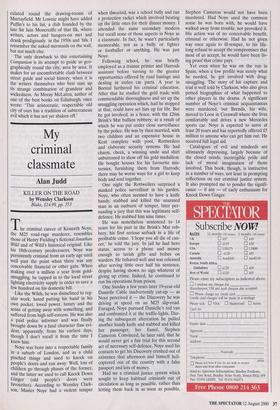My criminal classmate
Alan Judd
KILLER ON THE ROAD by Wensley Clarkson Blake, £14.99, pp. 353 The criminal career of Kenneth Noye, the M25 road-rage murderer, resembles those of Henry Fielding's fictional Jonathan 14'ild and of Wild's historical original. Like his 18th-century predecessors, Noye was persistently criminal from an early age until well past the point when there was any conceivable financial or other gain. When making over a million a year from gold- smuggling, he tapped in to the local street lighting electricity supply in order to save a few hundred on his domestic bill.
Like the Wilds, he was disinclined to reg- ular work, hated putting his hand in his own pocket, loved power, luxury and the sense of getting away with something, and suffered from high self-esteem. He was also a paid police informer and was finally brought down by a fatal character flaw evi- dent, apparently, from his earliest days, though I don't recall it from the time I knew him.
. Noye was born into a respectable family in a suburb of London, and as a child pinched things and used to knock on people's doors and run away. Well, lots of children go through phases of the former, and the latter we used to call Knock Down Ginger (old people's doors were favourites). According to Wensley Clark- son, Master Noye had a violent temper when thwarted, was a school bully and ran a protection racket which involved beating up the little ones for their dinner money. I attended the same secondary modern but recall none of those aspects in Noye as a classmate. In fact, he wasn't particularly memorable, not as a bully or fighter or footballer or anything. He was just Noye. Following school, he was briefly employed as a trainee printer and Harrods assistant before turning to the greater opportunities offered by road haulage and dealing in stolen car parts. A year in Borstal furthered his criminal education. After that he studied the gold trade with commendable thoroughness and set up the smuggling operation which, had he stopped at that, could have set him up for life. But he got involved, as a fence, with the £26m Brink's Mat bullion robbery, as a result of which he was put under close surveillance by the police. He was by then married, with two children and an expensive house in Kent complete with pool, Rottweilers and elaborate security systems. He had charm, cheek, a winning smile and shirt unbuttoned to show off his gold medallion. He bought houses for his favourite mis- tresses, furnishing them from Harrods; there may be worse ways for a girl to keep body and soul together.
One night the Rottweilers surprised a masked police surveillant in his garden. Noye, who often seemed to have a knife handy, stabbed and killed the unarmed man in an outburst of temper, later per- suading a jury that this was legitimate self- defence. He stabbed him nine times.
He was nonetheless sentenced to 14 years for his part in the Brink's Mat rob- bery, his first serious setback in a life of profitable crime. 'I hope you all die of can- cer,' he told the jury. In jail he had hero status, access to a phone and money enough to lavish gifts and bribes on warders. He behaved well and was released after serving little over half his sentence, despite having shown no sign whatever of giving up crime. Indeed, he continued to run his operations from prison.
One Sunday a few years later 19-year-old Danielle Cable inadvertently cut-up — as Noye perceived it — the Discovery he was driving at speed on an M25 slip-road. Enraged, Noye pursued Danielle's red van and confronted it at the traffic-lights. Dur- ing the subsequent altercation he pulled another handy knife and stabbed and killed her passenger, her fiancé, Stephen Cameron. Convinced, he later said, that he would never get a fair trial for this second act of necessary self-defence, Noye used his contacts to get his Discovery crushed out of existence that afternoon and himself heli- coptered out of the country with a false passport and lots of money.
Had we a criminal justice system which sought to keep habitual criminals out of circulation as long as possible, rather than letting them back in as soon as possible, Stephen Cameron would not have been murdered. Had Noye used the common sense he was born with, he would have walked away from trouble, not provoked it. His action was of no conceivable benefit, criminal or otherwise. Had he not given way once again to ill-temper, to his life- long refusal to accept the compromises that most of us accept, he would have been liv- ing proof that crime pays.
Yet even when he was on the run in Spain, when a low profile was surely what he needed, he got involved with drug- smuggling. The story of his capture and trial is well told by Clarkson, who also gives potted biographies of what happened to other players in the drama. A significant number of Noye's criminal acquaintances were murdered, but Brenda, his wife, moved to Looe in Cornwall where she lives comfortably and drives a new Mercedes sports car. Noye is expected to serve at least 20 years and has reportedly offered £5 million to anyone who can get him out. He received full legal aid.
Catalogues of evil and misdeeds are ultimately depressing, largely because of the closed minds, incorrigible pride and lack of moral imagination of those involved. This book, though, is instructive in a number of ways, not least in prompting reflections on our criminal justice system. It also prompted me to ponder the signifi- cance — if any — of early enthusiasm for Knock Down Ginger.


























































 Previous page
Previous page